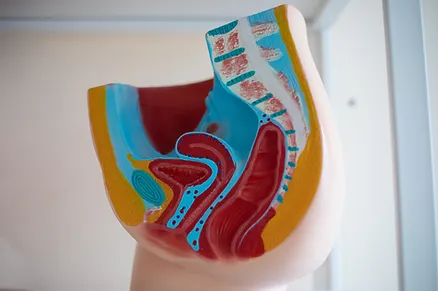What is pelvic floor dysfunction?
Pelvic floor dysfunction is a common condition where you’re unable to correctly relax and coordinate the muscles in your pelvic floor to urinate or to have a bowel movement. If you’re a woman or assigned female at birth (AFAB), you may also feel pain during sex, and if you’re a man or assigned male at birth (AMAB), you may have problems having or keeping an erection (erectile dysfunction or ED). Your pelvic floor is a group of muscles found in the floor (the base) of your pelvis (the bottom of your torso).
If you think of the pelvis as being the home to organs like your bladder, uterus or prostate, and rectum, the pelvic floor muscles are the home’s foundation. These muscles act as the support structure keeping everything in place within your body. Your pelvic floor muscles add support to several of your organs by wrapping around your pelvic bone. Some of these muscles add more stability by forming a sling around your rectum.
Your pelvic organs include:
- Your bladder (the pouch holding your urine).
- Your uterus and vagina (in women).
- Your prostate (in men).
- Your rectum (the area at the end of your large intestine where your body stores solid waste).
Normally, you’re able to go to the bathroom with no problem because your body tightens and relaxes its pelvic floor muscles. This is just like any other muscular action, like tightening your biceps when you lift a heavy box or clenching your fist.
But if you have pelvic floor dysfunction, your body keeps tightening these muscles instead of relaxing them as it should. This tension means you may have:
- Trouble evacuating (releasing) a bowel movement.
- An incomplete bowel movement.
- Urine or stool that leaks.
Symptoms and Causes
What causes pelvic floor dysfunction?
The full causes of pelvic floor dysfunction are still unknown. But a few of the known factors include:
- Traumatic injuries to your pelvic area (like a car accident).
- Pregnancy.
- Overusing your pelvic muscles (like going to the bathroom too often or pushing too hard), eventually leading to poor muscle coordination.
- Pelvic surgery.
- Being overweight.
- Advancing age.
Does pregnancy cause pelvic floor dysfunction?
Pregnancy is a common cause of pelvic floor dysfunction. Often women or people AFAB experience pelvic floor dysfunction after they give birth. Your pelvic floor muscles and tissues can become strained during pregnancy, especially if your labor was long or difficult.
Is pelvic floor dysfunction hereditary?
Pelvic floor dysfunction can run in your family. This is called a hereditary condition. Researchers are looking into a potential genetic cause of pelvic floor dysfunction.
What does pelvic floor dysfunction feel like?
Several symptoms may be a sign that you have pelvic floor dysfunction. If you have any of these symptoms, you should tell your healthcare provider:
- Frequently needing to use the bathroom. You may also feel like you need to “force it out” to go, or you might stop and start many times.
- Constipation, or a straining pain during your bowel movements. It’s thought that up to half of the people who experience long-term constipation also have pelvic floor dysfunction.
- Straining or pushing really hard to pass a bowel movement or having to change positions on the toilet or use your hand to help eliminate stool.
- Leaking stool or urine (incontinence).
- Painful urination.
- Feeling pain in your lower back with no other cause.
- Feeling ongoing pain in your pelvic region, genitals or rectum — with or without a bowel movement.
Is pelvic floor dysfunction different for men and women?
There are different pelvic conditions that are unique to men (AMAB) and women (AFAB).
Pelvic floor dysfunction in men
Every year, millions of men around the world experience pelvic floor dysfunction. Because the pelvic floor muscles work as part of the waste (excretory) and reproductive systems during urination and sex, pelvic floor dysfunction can co-exist with many other conditions affecting men, including:
- Male urinary dysfunction: This condition can involve leaking urine after peeing, running to the bathroom (incontinence) and other bladder and bowel issues.
- Erectile dysfunction (ED): ED is when you can’t get or maintain an erection during sex. Sometimes, pelvic muscle tension or pain is the cause, but ED is a complex condition so this may not be the case.
- Prostatitis: Pelvic floor dysfunction symptoms closely resemble prostatitis, which is an infection or inflammation of your prostate (a male reproductive gland). Prostatitis can have many causes including bacteria, sexually transmitted infections or trauma to your nervous system.
Pelvic floor dysfunction in women
Pelvic floor dysfunction can interfere with a woman’s reproductive health by affecting the uterus and vagina. Women who get pelvic floor dysfunction may also have other symptoms like pain during sex.
Pelvic floor dysfunction is very different than pelvic organ prolapse. Pelvic organ prolapse happens when the muscles holding your pelvic organs (uterus, rectum and bladder) in place loosen and become too stretched out. Pelvic organ prolapse can cause your organs to protrude (stick out) of your vagina or rectum and may require you to push them back inside.
Living With pelvic floor dysfunction
Pelvic floor dysfunction isn’t currently listed as a U.S. Social Security disability. However, depending on your symptoms you may be able to claim disability under the Disability Evaluation Under Social Security Section 6.00, Genitourinary (genital and urinary) Disorders. For more information, check with your provider and Social Security contact.
Although pelvic floor dysfunction is a common condition, it can be embarrassing to discuss your pelvic floor dysfunction symptoms — especially your bowel movements. The good news is that many pelvic floor dysfunction symptoms are easy to treat.
If you think you might have pelvic floor dysfunction, make sure you see your provider early, especially if you have pain when going to the bathroom. Remember, the more open and honest you are with your provider, the better your treatment will be.





